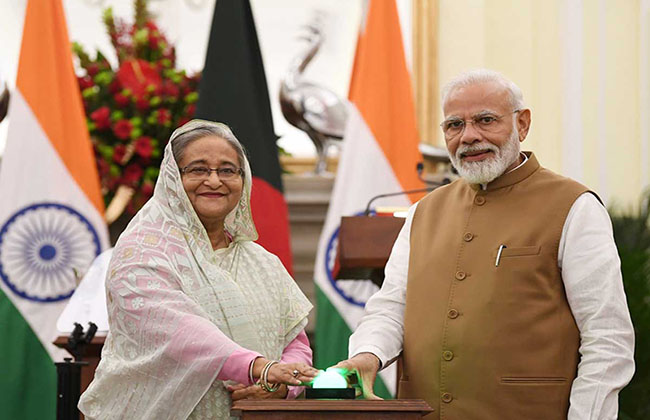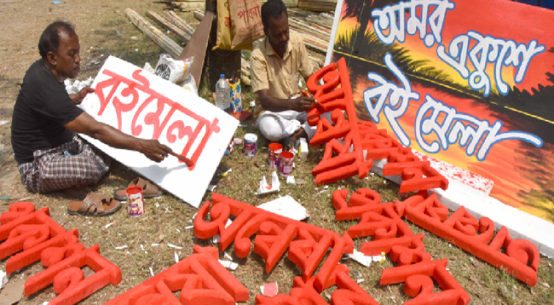
Bangladesh Prime Minister Sheikh Hasina and her Indian counterpart Narendra Modi emphasised the cooperation of both neighbouring countries for the economic prosperity and stability of the whole South Asia region.
Their hope was reflected during the joint press briefing after the official talks of the prime ministers at Hyderabad House in New Delhi on Tuesday, the second day of Hasina’s four-day state visit to India.
After the talks, both Hasina and Modi oversaw exchanging of seven memoranda of understanding (MoUs) signed between the concerned authorities of the two countries.
“I reiterated that India is the most important and closest neighbour of Bangladesh. Bangladesh-India bilateral relations are known to be the role model for neighbourhood diplomacy,” she said.
Hasina noted that over the last decade, both countries have achieved remarkable progress in a number of areas.
This is Hasina’s first visit after the bilateral relations of both countries reached the 50-year milestone. The premiers of the neighbouring countries have met 12 times since 2015. Modi last travelled to Bangladesh in 2021 to attend events organised to mark the birth centenary of Bangabandhu Sheikh Mujibur Rahman and 50 years of Bangladesh’s independence.
Referring to the signing MoU on the Kushiyara river, the Bangladesh PM said all the issues like the water sharing of 54 common rivers that included the Teesta water sharing treaty will be resolved.
“The two countries have resolved many outstanding issues and we hope that all outstanding issues, including Teesta water-sharing treaty, would be concluded at an early date,” she said.
Hasina said she concluded another round of fruitful discussions with Narendra Modi and its outcome will bring benefits to the people of both countries.
“We held the meeting in a spirit of close friendship and cooperation. We discussed a wide range of bilateral issues to take forward our relationship in the days ahead,” she said.
During the talks, the Bangladesh leader said they stressed the necessity for focusing on possible ways to accommodate each other’s priorities in a mutually beneficial manner.
“We discussed issues related to connectivity, trade and commerce, investment, water resources management, security, border and lines of credit,” she said.
At the briefing, Modi said Bangladesh and India have decided to extend cooperation in various sectors including IT, space and nuclear energy.
Modi also said his country will start talks on a comprehensive economic partnership agreement, or CEPA, with Bangladesh, aiming to finalise it when the South Asian nation graduates to become a developing country by 2026.
“Across Asia, India is the biggest market for exports from Bangladesh. To further expedite this progress, we will soon initiate discussions on a bilateral economic comprehensive partnership agreement,” he added.
The United Nations last year said Bangladesh is expected to make enough progress toward its development goals to reach developing nation status by 2026.
According to the United Nations COMTRADE database on international trade, Bangladesh is now India’s biggest trade partner in South Asia and the bilateral trade has grown from $9 billion to $18 billion in the last five years.
Modi congratulated both counties for signing the Kushiyara river treaty but remained silent on the crucial Teesta river deal.
He added that both India and Bangladesh have extended cooperation on flood mitigation.
“We have been sharing real-time data regarding floods with Bangladesh and have also discussed terrorism. It’s imperative that we together face the forces that are adversarial to us,” Modi said.


